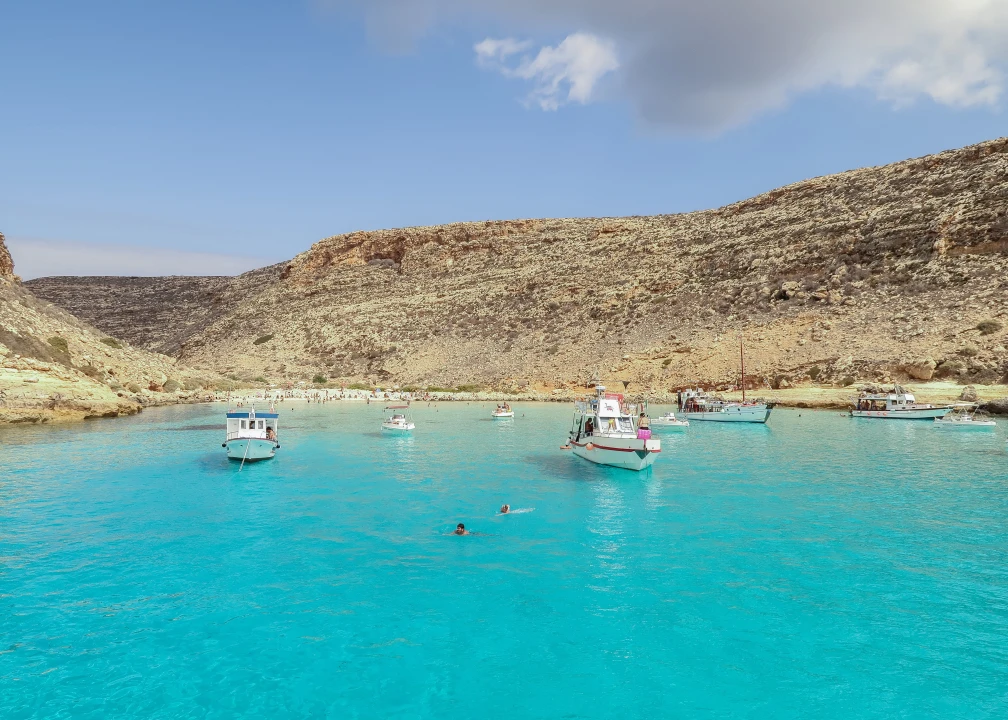It is one of the most-frequented destinations of sun-worshippers, scuba-divers and nature lovers, and it is the last trace of Italian terrain before the African coast. Lampedusa, glorious, sun-bleached island south of Sicily, helps to create the Pelagian Archipelago (“islands of the high sea” in Greek etymology), along with neighboring island Linosa and the Scoglio (a tiny boulder of an island) known as Lampione.
A borderland straddling two worlds, Lampedusa contains within it the environmental characteristics of two continents: it is, after all, only 70 miles from Tunisia, and 109 miles from Sicily.
See
The island’s northern and western coast is rather high and inaccessibile, while its eastern and southeastern shores boast magnificent, sandy beaches.
From the smallest and most hidden to the largest and most crowded, Lampedusa's beaches are numerous and welcoming.
First off, the splendid coves of Cala Pisana and Cala Uccello open onto the glistening sea, while the Calas Spugna and Maluk lie on the island’s east. Cala Greca, rather, is quite minuscule and covered in whiter-than-white sand; and one of the secrets on this island is Cala Galera, accessible by passing through the island's characteristic low, rocky gullies on the water. See the beach on the so-called Dead Sea, where the water is super calm, and the same-named Grotto; also remarkable are the spectacular and buzzing Cala Francese and the famous Guitgia Beach, the beach with the nearest hotels and accessible with public transport.
From here you can also reach Cala Croce and the beach on Cala Madonna, along with Porto N’Tone, a tiny beach with fine, white sand, ideal for families with children.
On the island’s southern side, Cala Pulcino and countless nearby grottoes can be found.
Do
A 3 or 4-hour boat ride off Lampedusa is the best way to appreciate the beauty of its beaches, coves and tiny harbors.
The sea’s clarity and the brilliant seafloor, abundant with flora and fauna, thrill scuba-divers and snorkelers, who can choose from a wide array of diving spots, both day and night.
A rather easy immersion is that in search of the underwater statue Madonna del Mare, 46 feet deep and surrounded by burrows for octopus and sargo fish. Their neighbors include dentex, groupers and more sargoes that make their home around this boulder that resembles a large panettone (the Milanese Christmas sweet). To swim through the expanse of green Neptune Grass, it is necessary to make a pit-stop at Punta Parrino, the point protecting the rest of the island from the waves and wind.
An underwater excursion at Taccio Vecchio is also rather moving for the fact that you can see the homonymous grotto and plenty of parrotfish! In the same zone lies Punta Cappellone, inhabited by tuna, sargo, dentex, grouper and greater amberjack; meanwhile, the eastern shallows host superb exemplars of the loggerhead sea turtle that you can witness yourself, tide-permitting.
The north, rather, is the site for lobster, dentex, rockfish and grouper burrows, and where sperm whales can be sighted in April.
If you are more of a land lover, you can walk the trails that run up to the island’s foremost three peaks: Monte Rosso, featuring a cultivated crater, Monte Nero and Monte Vulcano.
Be Sure To…
Visit Rabbit Island (Isola dei Conigli), one of the prettiest beaches in all the Med zone; the Island is protected, given its loggerhead sea turtle population that lays its eggs here. This work of nature is absolutely captivating, and can be reached even by non-swimmers – it is only 328 feet from the Lampedusa coast, over a stretch of water just a little over 3 m deep. Attempt to get to the other side of Rabbit Island if you want to spot its submerged natural arch, colonized by orange madrepores, colorful sponges, red shrimp, and rockfish and moray eel burrows.
During the hottest nights of the summer, make an effort to attend the many celebrations happening on the island’s beaches, including bonfires, spaghetti cookouts and barbecues, and musical performances.
Taste the fish cous cous, a mix of African and Sicilian flavors; in Lampedusa’s version the locals add shrimp, lobster and seafood, and accompany it with delicious chilled white wines.




